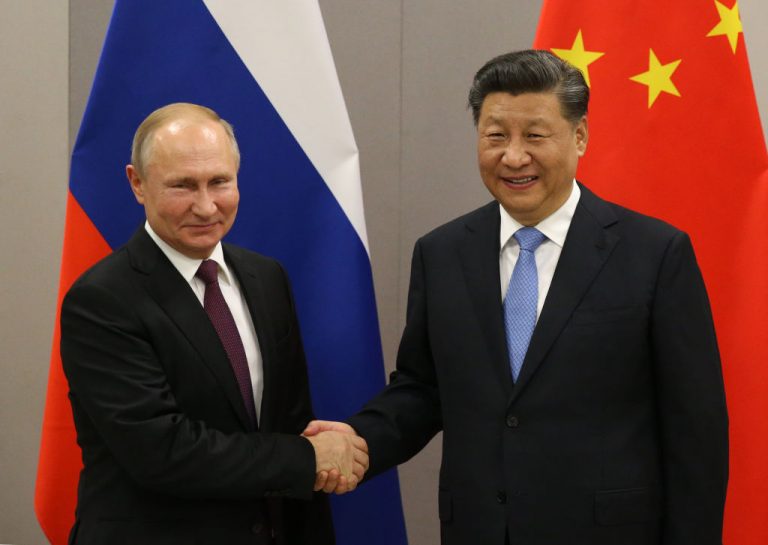Amid what may become the worst European conflict since World War II, Chinese leader Xi Jinping has urged the Kremlin to solve the Ukraine crisis through negotiation, during a call with Russian President Vladimir Putin.
In a readout of the call that took place today (Feb. 25) published by state-run media CCTV, Xi pointed out the “situation in eastern Ukraine has undergone rapid changes … [and] China supports Russia and Ukraine to resolve the issue through negotiation.”
Russian forces launched a full-scale invasion of Ukraine in the early hours of Thursday morning (Feb. 24) — unleashing air strikes and sending troops to seize all parts of the country — after weeks of diplomatic efforts failed to deter Putin from launching the military operation.
Since the invasion began, Beijing has toed a cautious diplomatic line on the crisis and refrained from calling it a “Russian invasion” or condemning the actions of its ally.
Xi: ‘Abandon the Cold War mentality’
Xi said of the Ukraine crisis that it is “important to “abandon the Cold War mentality, attach importance to and respect the reasonable security concerns of all countries, and form a balanced, effective and sustainable European security mechanism through negotiations.”
“China is willing to work with all parties in the international community to advocate a common, comprehensive, cooperative and sustainable security concept,” Xi said, according to the Chinese foreign ministry. He added that China remained neutral in the conflict.
The foreign ministry on Friday also stressed that Beijing believes the “sovereignty and territorial integrity of all countries” should be respected — a principle that “applies equally to Ukraine.”
Today’s phone call was confirmed in a tweet from China’s assistant minister for foreign affairs, Hua Chunying, who wrote: “President Xi Jinping has just spoken with his #Russian counterpart on the phone. President Vladimir Putin said that Russia is willing to have high-level dialogue with #Ukraine.”
Beijing lifts restrictions on Russian wheat imports
Success
You are now signed up for our newsletter
Success
Check your email to complete sign up
Earlier this month, China made a decision to allow imports of wheat from all regions of Russia during Putin’s visit to Beijing earlier this month, but the details were only just announced by China’s customs administration yesterday (Feb. 24).
Russia is the world’s top producer of wheat, producing approximately 85 million tons of it each year. Previously, China had restricted wheat imports from Russia due to concerns about the presence of dwarf bunt fungus — a disease that can cause severe loss of yield for wheat and other crops — in some parts of the country.
The move will help Beijing secure food supplies at a time when global food prices are already near 10-year highs. Wheat futures jumped by about 5 percent according to findings by the Chicago Board of Trade after the attack on Ukraine. The two countries account for about a third of the world’s wheat supply and were up by 12 percent as of this morning.
Food security is a key priority for Xi, who has called for increasing agricultural production and diversifying imports.
The agreement may also provide Russia’s economy with a lifeline at a time when exports to other countries are complicated by increasing financial sanctions from the West, and other disruptions in the global supply chain.
Putin: US and NATO responsible for triggering war with Ukraine
Also according to the Chinese media readout, Putin outlined the reasons for Russia launching the “special military operation,” as “long ignored security concerns” due to NATO and the United States repeated renegades on their “commitments to continued advance military deployment eastward, challenging Russia’s strategic bottom line,” Putin was quoted as telling Xi.
Weeks before the attack began, Xi and Putin issued an unprecedented joint statement seeming to align their visions for an anti-Western international order. In recent years, the two authoritarian powers have also bolstered diplomatic ties, including upping military cooperation and conducting joint maritime exercises, raising major alarms in Washington and within its Western allies.
Beijing and Moscow said they “oppose further enlargement of NATO” and called on the West “to abandon its ideologized cold war approaches.”


















